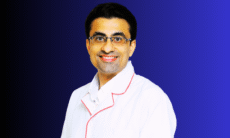Mumbai: In a remarkable display of medical expertise and human resilience, a 56-year-old woman diagnosed with Guillain-Barre Syndrome (GBS) has made a full recovery after six weeks of intensive treatment at Wockhardt Hospitals, Mumbai Central, under the care of Dr Prashant Makhija, Consultant Neurologist.
What began as minor limb weakness escalated within hours to complete paralysis, including respiratory failure. She was placed on a ventilator within the first 24 hours of admission.
A combination of clinical evaluation, cerebrospinal fluid analysis, and nerve conduction studies confirmed the diagnosis of GBS – a rare but potentially fatal autoimmune disorder where the body’s immune system attacks its own peripheral nerves.
Also Read: Manipal Hospital Dhakuria Performs First CRS with HIPEC on 60-Year-Old Patient
“GBS can be deceptive,” said Dr Prashant Makhija. “Patients may appear unresponsive, yet remain fully conscious. Early diagnosis and timely intervention can make the difference between life and death.”
The patient’s condition remained critical for weeks. Her son, who rushed from Delhi, and her husband, remained constant companions in the ICU waiting area. Their presence, combined with relentless medical support, played a vital role in her journey to recovery.
The multidisciplinary team – including neurologists, intensivists, respiratory therapists, and physiotherapists – administered intravenous immunoglobulin (IVIG) therapy and provided round-the-clock neurocritical care. Despite infections and unstable vitals, the team remained steadfast.
Also Read: Dr Parin Sangoi Saves Heart Attack Patient with Just 1 Per Cent Survival Chance
Weeks later, subtle signs of improvement emerged: eye contact, facial movements, and eventually the ability to breathe unaided. With extensive rehabilitation, she began regaining motor function, eating independently, and ultimately stood on her own.
Dr Prashant Makhija: Neurology is Not Just About Diagnostics and Treatment
“This case reminds us that neurology is not just about diagnostics and treatment,” reflected Dr Prashant Makhija. “It’s about the convergence of timely care, compassionate teamwork, and the strength of family.”
Recently, the patient walked into Dr Makhija’s clinic unaided – smiling, speaking, and full of gratitude. Her recovery is a testament to both medical science and the emotional tenacity of the human spirit.







